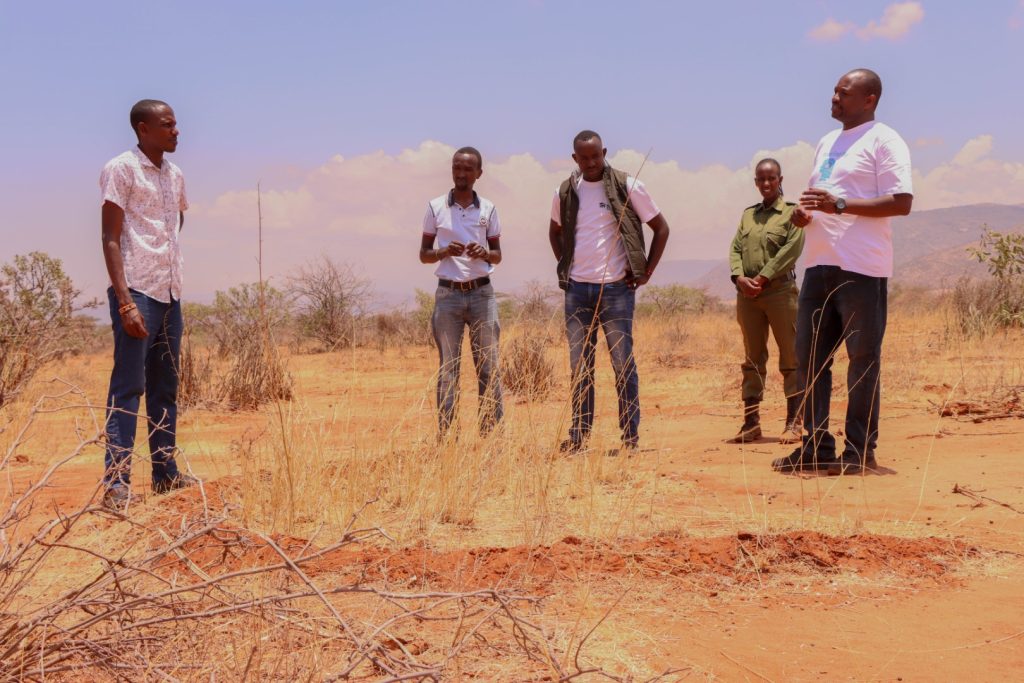Les zones arides et semi-arides), du Kenya, de la maison de millions de personnes qui dépendent de pastoralisme et de l'agriculture à petite échelle, sont en train de subir une transformation importante grâce aux efforts de l'Initiative de Restauration (TRI). Ces régions font face à des défis tels que la dégradation des terres, la déforestation et le surpâturage. TRI du projet emploie des approches axées sur les communautés de restaurer les terres dégradées et promouvoir des pratiques de gestion des terres dans le Mont Kulal Réserve de Biosphère dans le Comté de Marsabit & Mukogodo paysage de forêt dans le Comté de Laikipia. Par l'introduction de pratiques innovantes comme l'apiculture et des pâturages banques de semences, le projet vise à améliorer les services environnementaux, améliorer les moyens de subsistance des membres des communautés locales, et de renforcer la résilience contre le changement climatique.
Le TRI du projet au Kenya met l'accent sur l'ASAL régions, qui sont caractérisées par de faibles précipitations et sont à la maison à environ 16 millions de personnes qui comptent sur le pastoralisme et de l'agriculture pour leurs moyens de subsistance. Ces zones sont particulièrement vulnérables à la dégradation des terres due à la déforestation, le surpâturage, et des pratiques agricoles non durables. Du TRI approche combine l'engagement de la communauté, la gestion durable des terres, et de la politique de soutien à la restauration des terres dégradées et de renforcer la résilience des communautés locales. Les peuples autochtones du Kenya ont été une force motrice derrière TRI du Kenya ASAL projet, en fournissant perspicace de connaissances et de devenir actif dans la mise en œuvre de stratégies de restauration.
Des Impacts significatifs et la Progression
Depuis sa création, le TRI du projet dans les paysages arides du Kenya a fait des progrès significatifs dans la restauration des paysages dégradés, apportant 2,408 hectares de terres en vertu de la restauration et de 193,931 hectares en vertu de l'amélioration de la gestion. Travailler avec la communauté locale a été un thème dominant au Kenya, avec une communauté active de l'engagement de propulsion des efforts de restauration et de la diversification de la génération de revenus reçoit une attention importante. Le projet a touché la vie de 57,466 bénéficiaires directs, les personnes qui ont été habilités à la fois économiquement et écologiquement. En équipant collectivités locales avec les compétences et connaissances nécessaires pour maintenir la viabilité de la gestion des terres et la restauration, le projet a favorisé un fort sens de la gérance de l'environnement et de l'appropriation par la communauté.
L'Engagement de la communauté et le renforcement des Capacités
L'une des pratiques innovantes introduites par le TRI du projet est la promotion de l'apiculture comme une alternative aux moyens de subsistance pour les peuples autochtones. Le Mukogodo de la Forêt, une forêt aride du Kenya, a été identifié comme étant appropriés pour l'apiculture en raison de sa diversité agro écologique des zones. L'apiculture ne fournit pas seulement une source supplémentaire de revenus pour les communautés locales, mais aussi encourage l'utilisation durable des ressources forestières. Il est estimé que seulement 20 pour cent du total de miel valeur de la Mukogodo Forêt est actuellement en cours de récolte, ce qui montre un important potentiel de croissance.
Le projet a également mis l'accent sur l'élimination des espèces envahissantes telles que l'Opuntia, qui s'étouffer herbes et réduire fourrage pour le bétail. À travers les efforts de la communauté et de l'introduction d'une machine pour la fabrication de l'alimentation animale à partir de l'Opuntia, le projet a récupéré plus de domaines de pâturage et l'amélioration de la productivité de l'élevage. Épisodes récurrents de sécheresse et les conflits au sein des communautés sur les pâturages et l'eau ont prouvé à poser des questions. Cependant, le projet a mis en œuvre innovante de restauration des techniques telles que la Vallerani méthode de demi-lune et des micro-bassins de captage de l'eau et de conservation des sols. Ces techniques ont prouvé leur efficacité dans l'amélioration de l'humidité du sol et de la promotion de la croissance de la végétation dans les zones dégradées.
Pour insuffler un sens de la longévité au Kenya ASAL les terres des initiatives de restauration, TRI introduit l'Participative de Plans de Gestion Forestière, de la Gestion des Forêts des Accords et de la Communauté de préservation de la nature en tant que facilitateurs de la gestion durable des terres par le gouvernement et la Communauté Associations Forestières.
La Politique De Développement
Une critique de la réalisation du TRI du projet au Kenya a été sa contribution à l'élaboration des politiques. Le projet a permis la création de plusieurs politiques clés, y compris la facilitation de la Forêt et la Restauration du Paysage Plan d'Action (FOLAREP) processus de consultation dans l'ensemble des 47 comtés de l'ASAL région, ainsi que le développement de la 10 Ans de la Stratégie Nationale pour le développement Durable, la Commercialisation des Produits Forestiers Non Ligneux (Pfnl), de Partage Équitable des Avantages règlement, et 3 finalisé le Comté de Plans d'Action environnementale (Isiolo, Marsabit et de Laikipia, Comtés). Ces politiques fournissent un cadre solide pour la gestion durable et la restauration des écosystèmes forestiers, en veillant à la viabilité à long terme des impacts positifs du projet.
Le TRI du projet au Kenya ASAL régions témoigne le potentiel de la gestion intégrée approches de restauration dans la transformation des paysages dégradés dynamiques, des écosystèmes productifs. En combinant la restauration de la forêt avec des moyens de subsistance durables des activités, le projet n'améliore pas seulement la résilience écologique, mais aussi fournit des moyens de subsistance durables des opportunités pour les communautés locales.
